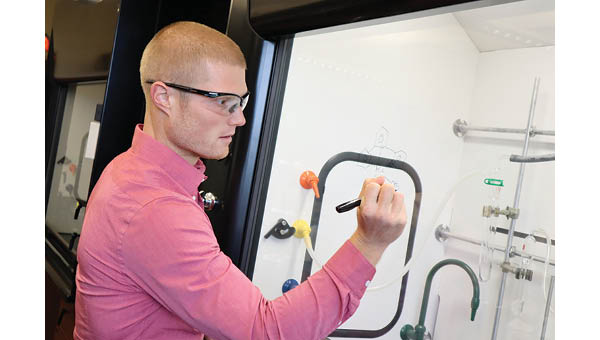Tusculum research on drugs to treat cancer receives boost with fellowship from ACA
Published 11:36 am Wednesday, January 4, 2023

- Photo Contributed Dr. Dennis Ashford, associate professor of chemistry at Tusculum University, works in one of the chemistry labs in the Meen Center at Tusculum.
|
Getting your Trinity Audio player ready...
|
Research by undergraduate chemistry and biology students at Tusculum University into another method to treat cancer, one that would spare healthy parts of the body, will benefit from a new grant that will enable the professor guiding them to dedicate additional time to the initiative.
The Appalachian College Association has selected Dr. Dennis Ashford, associate professor of chemistry, for a fellowship during the 2023-24 academic year. As part of the fellowship, Tusculum will receive funds to pay another instructor to teach one of Dr. Ashford’s courses in the fall and spring semesters.
This fellowship will contribute to the ongoing success of the research project, which has been active for four years except for a period in the initial stages of the global coronavirus pandemic.
“Having the fellowship frees up more of my time to mentor the research students when the largest number of them are on campus,” Dr. Ashford said. “It also provides me with further capacity to assist with some of the research and take care of administrative issues pertaining to this project.”
Since Dr. Ashford launched the cancer initiative, 20-25 Tusculum undergraduate students have participated in the research. They have been equally split between chemistry and biology majors. The chemistry students have primary responsibility for designing and making the compounds used in the research, while the biology students take the lead on studying the anti-cancer properties.
In a nutshell, the research group is looking at potential medications that can be activated by light to kill cancerous cells. Dr. Ashford said current chemotherapy treatments are effective but are harsh on the body and can impact noncancerous cells. Tusculum’s research is focused on creating a drug that will kill cancer but provide much less severe side effects from treatment by distributing medicine solely to the cancerous portion of the body.
“We discovered a pretty interesting balancing act between these drugs absorbing light the way we need for them to be clinically useful and then be able to act as anti-cancer agents,” Dr. Ashford said. “Our recent publication on our research to date described that interplay and our understanding of it and then educated our colleagues in the scientific community. These kinds of compounds had never had that description.
“Now, we’re taking those understandings and learnings and designing and synthesizing the second generation of new anti-cancer drugs that we can test and see how effective they are and what else we can learn from them to design even better ones in the future.”
Tusculum’s research team has created 15-20 compounds and has another five to develop in this phase of the project. The group performs some of the testing on the compounds and receives assistance from Florida State University and UVA-Wise in the analysis.
So far, the students and Dr. Ashford have published one paper on their research in Dalton Transactions, a chemistry publication that features research results. They have also made several presentations within the industry, including at an American Chemical Society conference, as well as on campus.
The research team has received extensive support for its work, including grants from the Arthur Vining Davis Foundations, the East Tennessee Foundation and Eastman. The fellowship from the ACA is the second Dr. Ashford has received from this organization to support this project.
Dr. Ashford is pleased with the progress the research team has made and looks forward to continuing the project.
“The discoveries we have made are really exciting for us,” he said. “We want to keep training students, continue publishing papers, proceed with the research and present at more conferences. Those are the major goals. If something bigger arises from this initiative, that will be icing on the cake.”
Many students who have participated in this research project and have graduated from the university have progressed to other academic pursuits, such as medical school and doctoral programs. Dr. Ashford said the anti-cancer research project has also served as a recruiting tool for high school students who might be interested in this type of activity.
Dr. Heather Henson-Ramsey, dean of the College of Science, Technology and Mathematics, said the chemistry and biology students’ research on anti-cancer drugs illuminates the value of a Tusculum education.
“This active and experiential learning opportunity reinforces our pioneering spirit and demonstrates why Tusculum is an exceptional university for students,” Dr. Henson-Ramsey said. “With Dr. Ashford’s guidance, these students are becoming career-ready professionals with skills that will serve them well in the workforce and in the pursuit of additional degrees. We are blessed with state-of-the-art facilities, such as the Meen Center, and cutting-edge research opportunities for our students, which make Tusculum the right place to enroll.”





